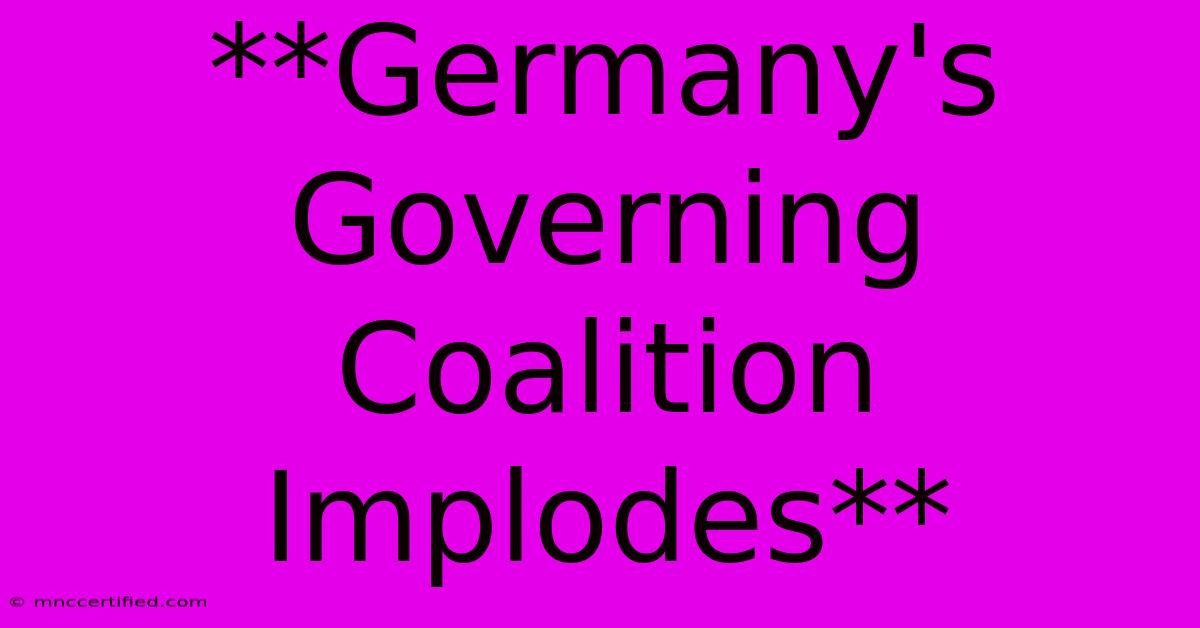**Germany's Governing Coalition Implodes**

Table of Contents
Germany's Governing Coalition Implodes: What's Next for Europe's Powerhouse?
The political landscape in Germany is in turmoil after the implosion of the governing coalition, a dramatic development with far-reaching consequences for the country and Europe as a whole. The collapse of the coalition between the Social Democratic Party (SPD), the Green Party, and the Free Democratic Party (FDP) marks the end of an era, leaving Germany facing an uncertain future.
The Cracks in the Foundation
The coalition's downfall can be attributed to a series of factors, including:
- Disagreements over economic policy: The FDP, with its strong focus on fiscal conservatism, clashed with the SPD and Greens on issues like energy policy, social spending, and tax reforms.
- Stalemate on defense spending: The parties struggled to reach consensus on increasing defense spending to meet NATO targets, a crucial issue given Russia's ongoing war in Ukraine.
- Internal divisions within the SPD: The SPD's internal struggles, fueled by the party's left wing's dissatisfaction with the coalition's direction, further weakened the government's stability.
The Fall of a Historic Partnership
The collapse of the coalition represents a major turning point in German politics. The SPD-Green-FDP alliance, formed in 2021 after a lengthy period of political deadlock, marked a shift towards a more progressive agenda in Germany. However, the coalition's demise highlights the challenges of forming and maintaining a stable government in a country with diverse political ideologies.
The Road Ahead: New Elections or a New Coalition?
The implosion of the coalition has thrown Germany into a political crisis. The options for the future are:
- Early elections: The most likely scenario is a snap election, potentially held within the next few months. This would allow voters to express their will and give a new mandate to a political party or coalition.
- Formation of a new coalition: While difficult, it's possible that a new coalition could emerge from the current parties or potentially include other parties, like the Christian Democratic Union (CDU) or the Christian Social Union (CSU).
Implications for Europe
The implosion of Germany's government carries significant implications for the European Union. Germany, as Europe's largest economy and a key driving force in EU policy, plays a vital role in addressing issues like:
- Energy crisis: Germany's decision to phase out nuclear power and rapidly transition to renewable energy sources has been crucial in tackling the energy crisis triggered by the war in Ukraine.
- European defense: Germany's commitment to strengthening European defense capabilities is vital to ensuring security for the entire continent.
- Economic stability: Germany's economic strength is a stabilizing force within the EU, influencing policies and contributing to overall prosperity.
The coalition's downfall raises questions about Germany's ability to maintain its leadership role in Europe during a time of immense challenges.
The Future of Germany
The implosion of the governing coalition signifies a period of uncertainty for Germany. The next few months will be crucial in determining the country's political direction. The outcome of the potential election or coalition talks will have far-reaching consequences for Germany's domestic and international policies.
Keywords: Germany, coalition, implosion, politics, SPD, Green Party, FDP, election, Europe, EU, energy crisis, defense, economy, instability, future, uncertainty, political crisis.

Thank you for visiting our website wich cover about **Germany's Governing Coalition Implodes**. We hope the information provided has been useful to you. Feel free to contact us if you have any questions or need further assistance. See you next time and dont miss to bookmark.
Featured Posts
-
M6 Reopens After Fatal Lorry Crash
Nov 08, 2024
-
Gerardi Insurance Services Inc Putnam Ct
Nov 08, 2024
-
Coventry City Faces Criticism After Dismissal
Nov 08, 2024
-
Outer Banks Season 5 News And Updates
Nov 08, 2024
-
Uefa Conference League Chelsea Vs Noah Live
Nov 08, 2024